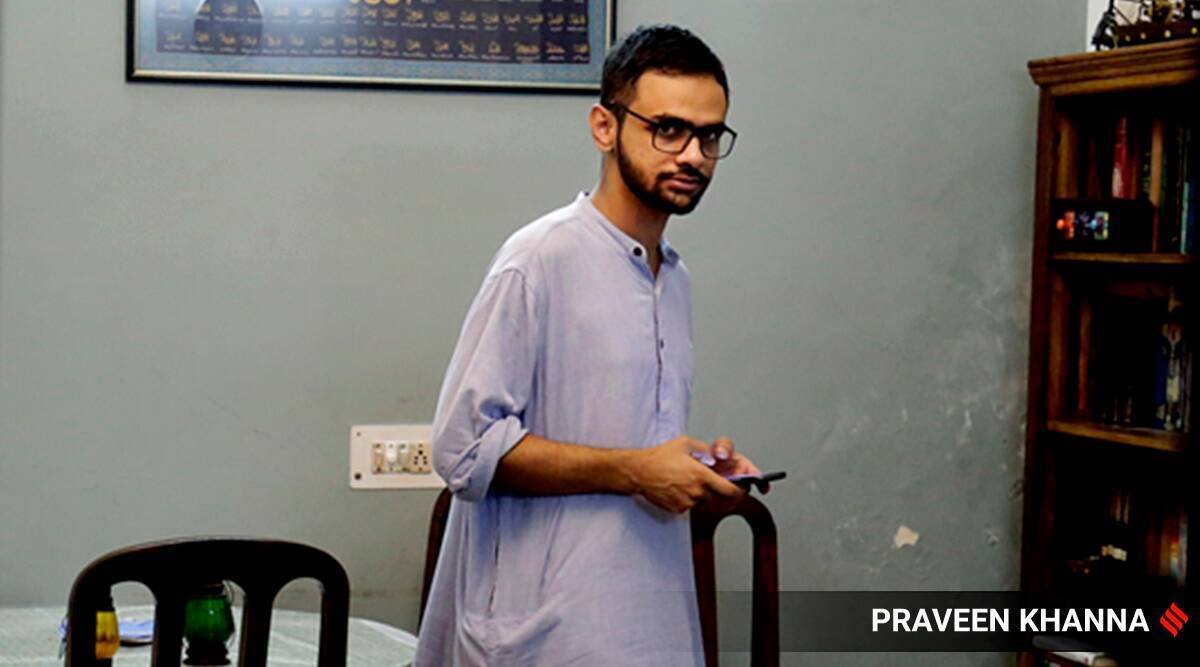 Student activist Umar Khalid. (File)
Student activist Umar Khalid. (File) While hearing the bail application of student activist Umar Khalid in the larger conspiracy case of northeast Delhi riots, the Delhi High Court on Wednesday asked whether it was proper to use the term ‘jumla’ in respect to the Prime Minister of India and said that there has to be “a line” or a “Lakshman rekha” when it comes to criticism of the government.
“What he says about the Prime Minister in the speech? Some ‘changa’ word was used and after that … this ‘jumla’ is used for the Prime Minister of India. Is that proper?” observed the court after listening to the speech given by Khalid at Amravati in February 2020.
Responding to the court’s observation, senior advocate Trideep Pais, who represents Khalid, argued that it was not illegal to criticise the government. “Criticism of the government cannot become a crime. 583 days in prison with UAPA charges was no envisaged for a person who speaks against the government. We cannot become so intolerant. At this rate, people will not be able to speak,” contended Pais, adding that the FIR against Khalid is a result of intolerance against freedom of speech.
The division bench of Justice Siddharth Mridul and Justice Rajnish Bhatnagar on April 22, while hearing the application, had said that Khalid’s speech at Amravati, which forms part of the chargesheet, was offensive, obnoxious and hateful.
Best of Express Premium
“This is offensive, obnoxious. Don’t you think? These expressions being used, don’t you think they incite people? You say things like aapke purvaj angrezon ki dalali kar rahe the, you don’t think it is offensive. It is offensive per se. This is not the first time that you said so in this speech. You said this at least five times. It is almost as if we distinctly get the impression that it was only one particular community that fought for India’s independence,” the division bench had said after Khalid’s lawyers read the contents of his speech before the court.
The court had made the observation when the counsel representing Khalid was reading the portion where he is reported to have said that Mahatma Gandhi had launched a non-cooperation movement against the British in 1920 and Jamia Millia Islamia University was one of the first educational institutes to be established after Gandhi’s call. Khalid in the speech is further stated to have said that the same varsity was now facing bullets, being maligned and called den of anti-nationals.
“Hum inko itihas batana chahte hai. Jab aapke purvaj angrezun ki dalali kar rahe the, tou Jamia Millia Islamia ke chathar, teachers, angreji hukumut se lad rahe the. (We want to remind them of the history. When your ancestors were brokering for the English, the Jamia Millia Islamia students, its teachers were fighting the British government),” Khalid was quoted as having said in the speech.
In the earlier part of the speech which was read before the court , Khalid, while calling the RSS and Hindu Mahasabha the “ancestors” of “current rulers” allegedly had said that the organizations were doing “dalali” of the British and since they want people to prove their ancestry, questions need to be asked about their ancestors too.
The court had asked, “Don’t you think it foments religious ferment between groups?”
Pais on Wednesday told the court that there was serious violence on students of Jamia Millia Islamia University in December 2019 and the speech was made in that context. “It does not refer to the communities. It refers to an organisation when the speech says that the ideological ancestors of the persons who inhabit this organisation did not participate in the freedom struggle, whereas the Jamia students were an active part of the freedom movement. He is not playing one community against another, that is what I wanted to clarify,” he submitted.
The court was hearing the appeal against the dismissal of his bail plea by a lower court in the case. It will continue after the lunch break today.
- The Indian Express website has been rated GREEN for its credibility and trustworthiness by Newsguard, a global service that rates news sources for their journalistic standards.

